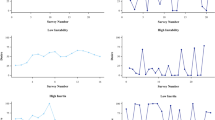Abstract
University-based community members (N = 181) participated in a four-wave, 6-month longitudinal experiment designed to increase treatment participants’ happiness levels. Participants were randomly assigned to set goals either to improve their life circumstances (comparison condition) or to increase their feelings of autonomy, competence, or relatedness in life (treatment conditions). We hypothesized that sustained gains in happiness would be observed only in the three treatment conditions, and that even these gains would last only when there was continuing goal engagement. Results supported these predictions and the sustainable happiness model on which they were based (Lyubomirsky et al. in Rev Gen Psychol 9:111–131, 2005). Furthermore, participants with initial positive attitudes regarding happiness change obtained larger benefits. We conclude that maintained happiness gains are possible, but that they require both “a will and a proper way” (Lyubomirsky et al. in Becoming happier takes both a will and a proper way: two experimental longitudinal interventions to boost well-being, 2009).


Similar content being viewed by others
References
Brunstein, J. (1993). Personal goals and subjective well being: A longitudinal study. Journal of Personality and Social Psychology, 65, 1061–1070.
Brickman, P., & Campbell, D. T. (1971). Hedonic relativism and planning the good society. In M. H. Appley (Ed.), Adaptation-level theory (pp. 287–305). New York: Academic Press.
Clark, A. E., Diener, E., Georgellis, Y., & Lucas, R. E. (2008). Lags and leads in life satisfaction: A test of the baseline hypothesis. The Economic Journal, 118, F222–F243.
Deci, E. L., & Ryan, R. M. (1985). Intrinsic motivation and self-determination in human behavior. New York: Plenum Publishing Co.
Deci, E. L., & Ryan, R. M. (2000). The “what” and “why” of goal pursuits: Human needs and the self-determination of behavior. Psychological Inquiry, 11, 227–268.
Diener, E., Emmons, R. A., Larsen, R. J., & Griffin, S. (1985). The satisfaction with life scale. Journal of Personality Assessment, 49, 71–75.
Kahneman, D. (1999). Objective happiness. In D. Kahneman, E. Diener, & N. Schwarz (Eds.), Well-being: The foundations of hedonic psychology (pp. 3–25). New York: Russell Sage Foundation.
Lucas, R. E. (2007). Long-term disability has lasting effects on subjective well-being: Evidence from two nationally representative longitudinal studies. Journal of Personality and Social Psychology, 92, 717–730.
Lucas, R. E., Clark, A. E., Georgellis, Y., & Diener, E. (2003). Reexamining adaptation and the set point model of happiness: Reactions to changes in marital status. Journal of Personality and Social Psychology, 84, 527–539.
Lucas, R. E., Clark, A. E., Georgellis, Y., & Diener, E. (2004). Unemployment alters the set point for life satisfaction. Psychological Science, 15, 8–13.
Lykken, D., & Tellegen, A. (1996). Happiness is a stochastic phenomenon. Psychological Science, 7, 186–189.
Lyubomirsky, S., Dickerhoof, R., Boehm, J. K., & Sheldon, K. M. (2009). Becoming happier takes both a will and a proper way: Two experimental longitudinal interventions to boost well-being (manuscript under review).
Lyubomirsky, S., Sheldon, K. M., & Schkade, D. (2005). Pursuing happiness: The architecture of sustainable change. Review of General Psychology, 9, 111–131.
Seligman, M. E. P., Steen, T., Park, N., & Peterson, C. (2005). Positive psychology progress: Empirical validation of interventions. American Psychologist, 60, 410–421.
Sheldon, K. M. (2004). Optimal human being: An integrated multi-level perspective. New Jersey: Erlbaum.
Sheldon, K. M., & Elliot, A. J. (1999). Goal striving, need-satisfaction, and longitudinal well-being: The self-concordance model. Journal of Personality and Social Psychology, 76, 482–497.
Sheldon, K. M., & Gunz, A. (2009). Psychological needs as basic motives, not just experiential requirements. Journal of Personality, 77, 1467–1492.
Sheldon, K. M., & Kasser, T. (1998). Pursuing personal goals: Skills enable progress, but not all progress is beneficial. Personality and Social Psychology Bulletin, 24, 1319–1331.
Sheldon, K. M., & Lyubomirsky, S. (2004). Achieving sustainable new happiness: Prospects, practices, and prescriptions. In A. Linley & A. Joseph (Eds.), Positive psychology in practice (pp. 127–145). London: John Wiley & Sons.
Sheldon, K. M., & Lyubomirsky, S. (2006). Achieving sustainable happiness: Change your actions, not your circumstances. Journal of Happiness Studies, 7, 55–86.
Sheldon, K. M., & Lyubomirsky, S. (2009). Change your actions, not your circumstances: An experimental test of the Sustainable Happiness Model. In A. K. Dutt & B. Radcliff (Eds.), Happiness, economics, and politics: Toward a multidisciplinary approach (pp. 324–342). Cheltenham: Edward Elgar.
Watson, D., Clark, L. A., & Tellegen, A. (1988). Development and validation of brief measures of positive and negative affect: The PANAS scales. Journal of Personality and Social Psychology, 54, 1063–1070.
Author information
Authors and Affiliations
Corresponding author
Rights and permissions
About this article
Cite this article
Sheldon, K.M., Abad, N., Ferguson, Y. et al. Persistent pursuit of need-satisfying goals leads to increased happiness: A 6-month experimental longitudinal study. Motiv Emot 34, 39–48 (2010). https://doi.org/10.1007/s11031-009-9153-1
Published:
Issue Date:
DOI: https://doi.org/10.1007/s11031-009-9153-1




